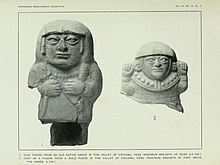| Part of a series on |
| Theism |
|---|
| Part of a series on |
| Anthropology of religion |
|---|
 |
| Social and cultural anthropology |
Transtheism refers to a system of thought or religious philosophy that is neither theistic nor atheistic, but is beyond them. The word was coined by either theologian Paul Tillich or Indologist Heinrich Zimmer.[1]
Zimmer applies the term to Jainism, which is theistic in the limited sense that gods exist but are irrelevant as they are transcended by moksha (that is, a system that is not non-theistic, but in which the gods are not the highest spiritual instance). Zimmer (1953, p. 182) uses the term to describe the position of the Tirthankaras having passed "beyond the godly governors of the natural order."
The term has more recently also been applied to Buddhism,[2] Advaita Vedanta,[3] and the Bhakti movement.[4]
- ^ In published writings, the term appears in 1952 for Tillich and in 1953 for Zimmer. Since the two men were personally acquainted, it is difficult to say which of them coined the term. Note that the term transtheism is avoided by both.
- ^ Antonio Rigopoulos, The Life and Teachings of Sai Baba of Shirdi (1993), p. 372; J. L. (Ed) Houlden, Jesus: The Complete Guide (2005), p. 390
- ^ Steven T. Katz, Mysticism and Sacred Scripture, Oxford University Press (2000), p. 177 ; Pulasth Soobah. Roodurmun, Kanshi Ram, Bhāmatī and Vivaraṇa Schools of Advaita Vedānta, Motilal Banarsidass (2002), p. 172
- ^ Werner Karel, Love Divine: Studies in Bhakti and Devotional Mysticism (1993), p. 153